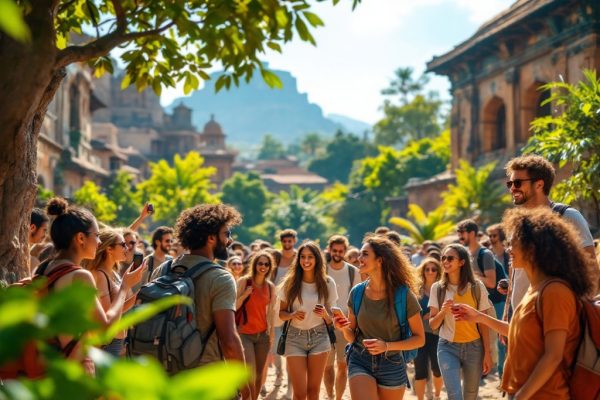The Role of Universities in Promoting Educational Tourism
Discover how universities are revolutionizing educational tourism! They’re not just centers of learning; they’re economic engines and cultural hubs. From boosting local businesses and creating jobs to fostering global awareness and cross-cultural understanding, universities are transforming communities. Explore the dynamic interplay between education, tourism, and economic growth, and see how you can be a part of it. Dive in to learn more!
Important information

- Universities are key drivers of educational tourism, attracting international students and professionals through unique programs and cultural immersion opportunities.
- Educational tourism boosts local economies through student spending, supporting businesses and job creation.
- Cultural exchange is a major benefit, fostering understanding and tolerance between international students and local communities.
- Collaboration with Destination Marketing Organizations (DMOs) helps universities reach wider audiences and promote themselves as tourist destinations.
- Study abroad programs enrich students’ education and career prospects through global learning and experiential opportunities.
The Role of Universities in Promoting Educational Tourism
Universities play a vital role in educational tourism by connecting visitors with local communities, fostering learning, and supporting growth through community projects. They promote sustainable practices while driving economic growth by offering unique programs and experiences that attract international students and tourists.
This creates a vibrant atmosphere for learning and cultural exchange, encouraging collaboration between local and international students.
Furthermore, universities host conferences, workshops, and seminars, attracting academics and professionals worldwide, further boosting educational tourism. They offer a unique blend of academic excellence and cultural immersion, coupled with personal development opportunities.
For example, universities partner with local organizations to create programs showcasing regional culture, history, and natural beauty, enriching the educational tourism experience.
Understanding Educational Tourism
Educational tourism is a rapidly expanding sector of the travel industry, offering enriching cultural experiences combined with learning opportunities. It allows travelers to explore new destinations while simultaneously expanding their knowledge. It provides travelers with a unique opportunity to immerse themselves in the history, art, and traditions of a place. Moreover, educational tourism fosters cross-cultural understanding and promotes global citizenship.
Universities as Catalysts for Educational Tourism
Universities play a vital role in the growth of educational tourism and local economies. They attract international students and researchers with their specialized programs, generating economic opportunities for local entrepreneurs. Collaborations between universities, businesses, government entities, and community groups further strengthen the local economy and promote educational tourism. University-hosted conferences and workshops draw visitors, boosting businesses such as hotels, restaurants, and transportation services.
Benefits of Educational Tourism
Educational tourism significantly boosts local economies. Students contribute financially by spending on accommodations, meals, transportation, and entertainment, directly supporting local businesses, creating job opportunities, and fueling regional economic expansion. Furthermore, it fosters cultural exchange as international students introduce diverse perspectives and share their customs. These interactions with local communities cultivate greater cultural understanding, leading to increased tolerance and appreciation. Educational tourism promotes global awareness and enhances valuable cross-cultural communication skills in our increasingly interconnected world.
Economic Impact
Student spending on accommodations, meals, transportation, and entertainment directly supports local businesses and creates job opportunities, contributing to regional economic growth.
Cultural Exchange
International students bring diverse perspectives and share their customs, fostering cultural exchange and promoting greater understanding and tolerance within communities.
Global Awareness
Educational tourism promotes global awareness, a crucial asset in our interconnected world.
Cross-Cultural Communication
Students enhance their cross-cultural communication skills through interactions with diverse communities.
Economic Impact on Local Communities
Educational tourism significantly boosts local economies. Visitors spend money at restaurants, shops, and hotels, creating job opportunities. It also fosters entrepreneurship by opening new markets and helping tourism-related businesses flourish, such as tour operators, cultural centers, and language schools. The resulting infrastructure improvements benefit both visitors and residents, including better transportation, enhanced public spaces, and renovated historical sites.
Cultural Exchange and Intercultural Competence
Cultural exchange programs connect international students with local communities, fostering valuable intercultural skills. Through programs like language exchanges, homestays, and community projects, students develop adaptability, enhance communication, and cultivate empathy. These experiences broaden their understanding of diverse perspectives and promote global citizenship, increasing their awareness of the world. Participating in these programs offers several key benefits:
- Improved communication: interacting with native speakers enhances language fluency and comprehension.
- Increased adaptability: navigating new cultural settings fosters resilience and problem-solving skills.
- Greater empathy: experiencing different cultures firsthand cultivates understanding and appreciation for diverse perspectives.
Universities and Local Development
Universities foster strong partnerships with local businesses, government agencies, and community organizations to tackle shared challenges. These collaborations enhance educational programs and benefit the entire community through joint projects. For example, universities offer workforce training, conduct collaborative research initiatives, and participate in community outreach activities.
Fostering Relationships with Local Stakeholders
Universities foster strong partnerships with local businesses, government agencies, and community organizations. These collaborations create valuable opportunities for students, such as internships and volunteering, and facilitate joint projects. This synergistic approach benefits both educational tourism and the local economy. Students support local businesses, and the partnerships generate new jobs, benefiting the entire community.
International Students as Educational Tourists
International students offer numerous advantages to their host communities. Their spending stimulates local economies, and their involvement in community activities fosters mutually beneficial connections. Students acquire invaluable experiences, while host locations flourish.
Cultural Immersion
Many international students immerse themselves in the local culture by attending festivals and events.
Campus and Community Enrichment
Their presence on campuses and in the wider community fosters intercultural understanding and enriches the student body.
The World Tourism Organization has also noted a rising trend of these students engaging in tourism during their studies. While they contribute to the tourism sector, they are much more than tourists; they are valuable members of the community.
Engagement in Local Activities
International students can deepen their cultural understanding and connect with the community by actively participating in local festivals, museums, and culinary experiences. These immersive encounters enhance educational tourism, offering valuable insights into local customs and traditions. Simultaneously, the community benefits from new perspectives and cross-cultural exchange, enriching the overall experience.
Study Abroad Programs and Student Mobility
Study abroad programs offer students invaluable global and experiential learning opportunities, significantly impacting their careers. These programs expose students to diverse academic perspectives and foster international collaborations. Experiential learning, through internships and research projects, equips students with practical skills and real-world experience, enhancing their education and improving job prospects. Various program types promote both personal and professional growth, ultimately benefiting students’ career paths.
Semester exchanges offer immersive cultural experiences and in-depth academic study at a partner university.
Summer programs provide short-term, focused learning experiences, ideal for specialized courses or language acquisition.
International internships offer practical work experience in a global setting, building professional skills and expanding networks.
Global Learning and Experiential Learning Opportunities
Study abroad programs offer incredible opportunities for global learning, immersing students in new cultures and academic environments. This firsthand experience exposes students to different ways of life, fostering valuable intercultural competence and adaptability. Through internships and community projects, students gain practical skills and develop a global mindset highly valued by employers.
Business students might intern at an international company, gaining real-world experience in a global market.
Engineering students could collaborate on a global research project, applying their skills to international challenges.
Humanities students can engage with diverse communities through local projects, broadening their understanding of different cultures.
These experiences not only enrich academic learning but also prepare students for successful global careers.
Study abroad is a worthwhile investment in your future.
Marketing Strategies for Educational Tourism
Collaborating with Destination Marketing Organizations (DMOs) is essential for promoting educational tourism. DMOs possess valuable insights into local markets and tourism trends, enabling targeted marketing campaigns that reach a broader audience. Promoting universities as tourist destinations attracts international students and showcases a campus’s distinct features—its history, architecture, and unique character—drawing in prospective students. Campus tours, open houses, and cultural events further enhance a university’s appeal. Beyond student recruitment, educational tourism strengthens university-community ties, fostering mutually beneficial relationships. These initiatives stimulate local economies, encourage cultural exchange, and elevate a university’s global standing.
Benefits of Partnering with DMOs for Educational Tourism
- Targeted marketing campaigns that reach a broader audience, leveraging DMOs’ expertise in local markets and tourism trends.
- Attracting international students by promoting universities as tourist destinations.
Advantages of Educational Tourism for Universities
- Showcasing a campus’s distinct features, including its history, architecture, and unique character, to attract prospective students.
- Strengthening university-community ties, fostering mutually beneficial relationships.
- Stimulating local economies, encouraging cultural exchange, and elevating the university’s global standing.
Collaboration with Destination Marketing Organizations
Universities and destination marketing organizations (DMOs) form invaluable partnerships that expand their reach to prospective students worldwide. This collaboration increases visibility and attracts a diverse student body. Joint marketing campaigns and campus visits are common strategies, showcasing both the university and its surrounding area. DMOs provide universities access to their extensive networks, facilitating valuable connections. Perhaps the greatest advantage is the boost to educational tourism, benefiting both the university and the DMO. This synergistic partnership expands each organization’s influence while fostering enriching cultural exchange.
Campus Tourism as a Tourism Destination
Campus tourism transforms universities into captivating attractions, drawing visitors eager to explore educational settings while simultaneously bolstering local economies. This approach effectively integrates educational tourism into the local economic landscape. Universities offer fascinating tours of historical buildings, museums, and specialized facilities, such as state-of-the-art laboratories and impressive observatories. Furthermore, vibrant cultural events like performances and festivals create unique experiences for tourists and boost local businesses through increased visitor spending. Ultimately, campus tourism forges a valuable connection between education and economic prosperity.













